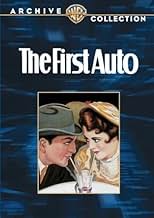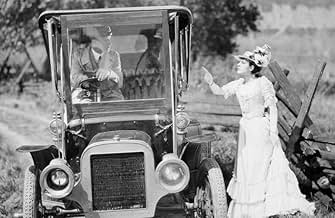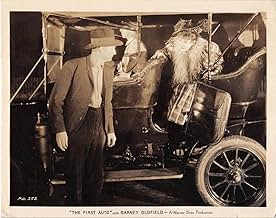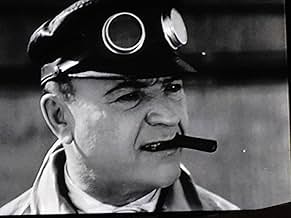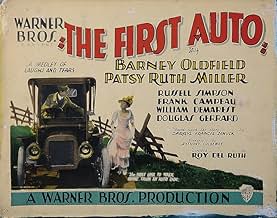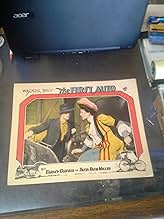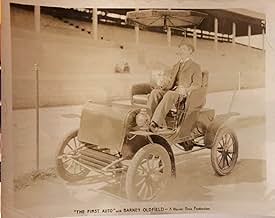Füge eine Handlung in deiner Sprache hinzuHank owns horses, stables horses and races horses. He favorite horse always wins and he is prosperous and well known. His son (Bob), however, dreams only of the future of the horseless carri... Alles lesenHank owns horses, stables horses and races horses. He favorite horse always wins and he is prosperous and well known. His son (Bob), however, dreams only of the future of the horseless carriage and not of the horse. This causes problems between Hank and Bob. As the people in the ... Alles lesenHank owns horses, stables horses and races horses. He favorite horse always wins and he is prosperous and well known. His son (Bob), however, dreams only of the future of the horseless carriage and not of the horse. This causes problems between Hank and Bob. As the people in the town convert from horses to autos, Hank detests those who switch - so he loses his friends... Alles lesen
- Regie
- Drehbuch
- Hauptbesetzung
- Bob Armstrong
- (as Chas. E. Mack)
- Joe Saunders
- (Nicht genannt)
- Livery Handler at Auction
- (Nicht genannt)
- Townsperson Who Laughs Heartily
- (Nicht genannt)
- Elmer Hays
- (Nicht genannt)
- Boy
- (Nicht genannt)
- Young Woman
- (Nicht genannt)
- Barber
- (Nicht genannt)
- Mrs. Stebbins
- (Nicht genannt)
Empfohlene Bewertungen
Mack is a member of the "Horseless Carriage" generation, and is enthralled with the newly developing automobiles. When "Sloe Eyes" succumbs to a stroke, it seems like Simpson's older generation is passing in favor of Mack's auto-crazy youth. But, the passing mare leaves a young colt, "Bright Eyes", with enough horse sense to give primitive kerosene-powered buggies a run for their money. Yet, for the hoof set, it's a losing battle; and, the automobile takes control of the streets. Estranged from his son, Simpson slips into madness and despair. Then, an opportunity to reconcile with young Mack meets with tragedy
The tragedy depicted on-screen was nothing compared to the tragedy occurring off-screen; co-star Charles Emmett Mack was killed (decapitated, reportedly) in a real-life automobile accident on the way to a filming location fro this film. This sadness accompanied the premiere of "The First Auto", as audiences were well aware of Mack's passing. The film is valuable for its early automobile scenes, which were then much of the population's collective memory. Mack could not, obviously, complete his assignment; and, the movie suffers without two essential Mack scenes, near the end of the story.
Mack was a rising star, but it's difficult to determine how he would have transitioned into talking pictures; certainly, this film positioned him well. Warner Bros. used some dialogue in the "sound effects" track of "The First Auto" (common practice, then), which reached critical mass with "The Jazz Singer". Mack was considered an actor of consequence; he was one of Director D.W. Griffith's best latter period "discoveries", making strong impressions in "Dream Street" (1921) and "One Exciting Night" (1922). "The First Auto" also features Barney Oldfield (a celebrity driver) and William Demarest (Uncle Charlie on "My Three Sons").
****** The First Auto (6/27/27) Roy Del Ruth ~ Russell Simpson, Charles Emmett Mack, Patsy Ruth Miller
The story is not that dramatic. It feels as inevitable as the spread of the automobile. It's a little like Hank. I also wonder if this was financed by Ford. Early real racer Barney Oldfield has a minor role. I've never heard of the name but it's interesting to learn something. The old car racing is quite compelling. It has a recklessness about it although I would definitely get rid of the fake flames. The effect looks bad. This is an easy story and probably more compelling for people who lived through the era.
*** (out of 4)
Hank Armstrong (Russell Simpson) is a lover of horses. He breeds them, races them and cares for them more than he does his own son (Charles Emmett Mack). Our story runs from 1895-1905 as we see the horses being put out of business by the "horseless carriage" and we see Hank fall apart as he refuses to let go and accept where the future is going. There's a lot of nice stuff in this film, which would turn out to be the sixth movie Warner would release with sound effects and a musical accompaniment. I personally find these effects to be quite distracting and to me they never really add much to a film except for an early part of sound history. Another negative thing is that this silent movie has more inter-titles than any other film I can think of. There was a time when we were reading more than watching so needless to say there was too many but this might have been done due to a tragedy that happened during filming, which I'll mention later. Outside of those issues this is a very pleasant film that manages to be both funny, touching and quite silly at the same time. The highlight of the movie is a scene where the rich family in town get their new car and decide to take it out for a spin. After reading the instructions on how to drive, dad takes off and soon hell breaks loose. We've seen this type of scene before but it's handled so well here you can't help but laugh. Another memorable scene happens early one when Hank's favorite horse dies giving birth and he "rides" her into Heaven. This scene could have been a disaster but it works quite well and manages to be very sweet even though I'm curious what they did to the horse to get it to remain so still. The performances are all pretty good and that includes Simpson who is almost too good because his character is such a jerk that it's hard to gain sympathy for him. Patsy Ruth Miller, who most will remember from THE HUNCHBACK OF NOTRE DAME, is also pretty good and it's fun seeing Barney Oldfield, a major name in early autos. The tragic side to this film is that Charles Emmett Mack, a discovery of D.W. Griffith, was on his way to film the racing scenes at the end of the movie when his car was struck by a farm truck and he was decapitated. It's quite ironic that this would happen while on the way to film the racing scenes.
Wusstest du schon
- WissenswertesCharles Emmett Mack died in a car crash on his way to the studio four months prior to the release of this completed film, though he was not on his way to shoot a car chase to this film as has been often reported. Because of this unfortunate occurrence, when the film eventually was released, cast credits were rearranged, placing Barney Oldfield in top position, even though he only had a relatively short appearance in the film, and Mack was quietly placed in the bottom position, even though he was the star. [The credits for the version shown on TCM lists "Chas. E. Mack" third from the bottom with Oldfield listed last.]
- PatzerMr. Stebbins receives a letter from his insurance company canceling his policy dated 1897, but his car is a 1906 model.
- Zitate
Opening Title Card: Once upon a time, a horse was a horse... and was loved as such. This was even before Dan Patch started breaking records, or the Vanderbilt cup races had come to displace the county fair. The latest thing then was a bicycle built for two... Bryan hadn't been heard of... and a nickel was still respected -...
- Crazy Credits"A Romance Of The Last Horse And The First Horseless Carriage"
- VerbindungenEdited into Gadgets Galore (1955)
- SoundtracksIn My Merry Oldsmobile
(1905) (uncredited)
Music by Gus Edwards
In the score during the opening credits, at the end and as background music
Top-Auswahl
Details
- Laufzeit
- 1 Std. 15 Min.(75 min)
- Farbe
- Sound-Mix
- Seitenverhältnis
- 1.33 : 1

